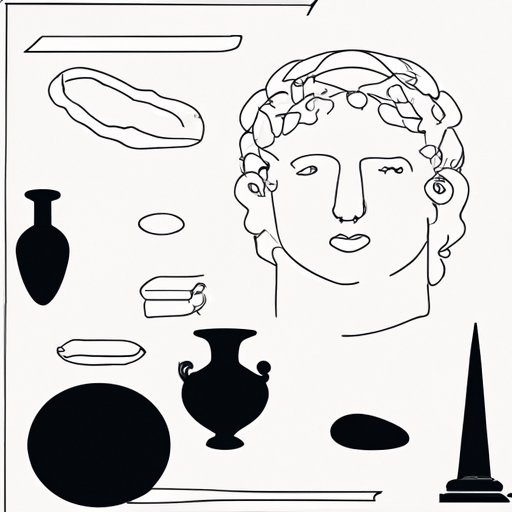Introduction
Greco-Roman culture refers to the culture of ancient Greece and Rome, which had a significant influence on the development of Western civilization. This article will explore the history, art, mythology, religion, philosophy, and literature of Greco-Roman culture, as well as its legacy and impact on modern society.
History of Greco-Roman Culture
The Greco-Roman period began with the rise of the ancient Greek and Roman empires in the 8th century BCE. During this time, Greek and Roman societies experienced tremendous growth and development in politics, economics, culture, and science. Key events in Greco-Roman history include the fall of the Roman Republic in 27 BCE and the rise of the Roman Empire in 31 BCE, as well as the decline of the Roman Empire in 476 CE.
Exploration of Greco-Roman Art and Architecture
Greco-Roman art was highly influential in the development of Western art. It featured naturalistic depictions of the human body and a focus on idealized beauty. Examples of Greco-Roman art include sculptures such as the Venus de Milo and the Laocoön group. Greco-Roman architecture was characterized by grandiose public spaces, such as the Colosseum in Rome and the Parthenon in Athens.
Influence of Greco-Roman Mythology
Greco-Roman mythology is an important part of Greco-Roman culture. It includes stories about gods, goddesses, heroes, and monsters, many of which have been passed down through generations. These myths were used to explain natural phenomena, provide moral lessons, and shape cultural values. The significance of Greco-Roman myths can be seen in their lasting influence on literature, art, and other forms of culture.
Comparison of Greco-Roman Religion to Other Belief Systems
Greco-Roman religion was polytheistic, meaning that it included multiple gods and goddesses. It also included rituals, ceremonies, and festivals that were held to honor the gods. When compared to other belief systems, such as Christianity and Islam, Greco-Roman religion was more focused on honoring the gods than on spiritual salvation or moral guidance.
Role of Philosophy in Greco-Roman Society
Philosophy played an important role in Greco-Roman culture. Philosophers such as Socrates, Plato, and Aristotle developed theories about the nature of reality and the purpose of life. Their ideas shaped the way people thought about morality, justice, and politics, and had a lasting impact on Western civilization.
Impact of Greco-Roman Literature
Greco-Roman literature was a major part of Greco-Roman culture. It included works such as Homer’s Iliad and Odyssey, Virgil’s Aeneid, and Ovid’s Metamorphoses. These works are still studied and admired today for their insight into human nature and the power of storytelling.
Legacy of Greco-Roman Culture
The legacy of Greco-Roman culture can be seen in many aspects of modern life. For example, democracy, the rule of law, and the concept of civil rights all originated in ancient Greece. Greco-Roman art, literature, and mythology continue to influence modern art, literature, and popular culture. Finally, Greco-Roman philosophy has had a profound impact on the way we think about morality, ethics, and the nature of reality.
Conclusion
Greco-Roman culture has had a lasting and profound impact on modern society. Its history, art, mythology, religion, philosophy, and literature have shaped the way we think and live today. From democracy to literature, Greco-Roman culture continues to influence our lives in countless ways.
(Note: Is this article not meeting your expectations? Do you have knowledge or insights to share? Unlock new opportunities and expand your reach by joining our authors team. Click Registration to join us and share your expertise with our readers.)
